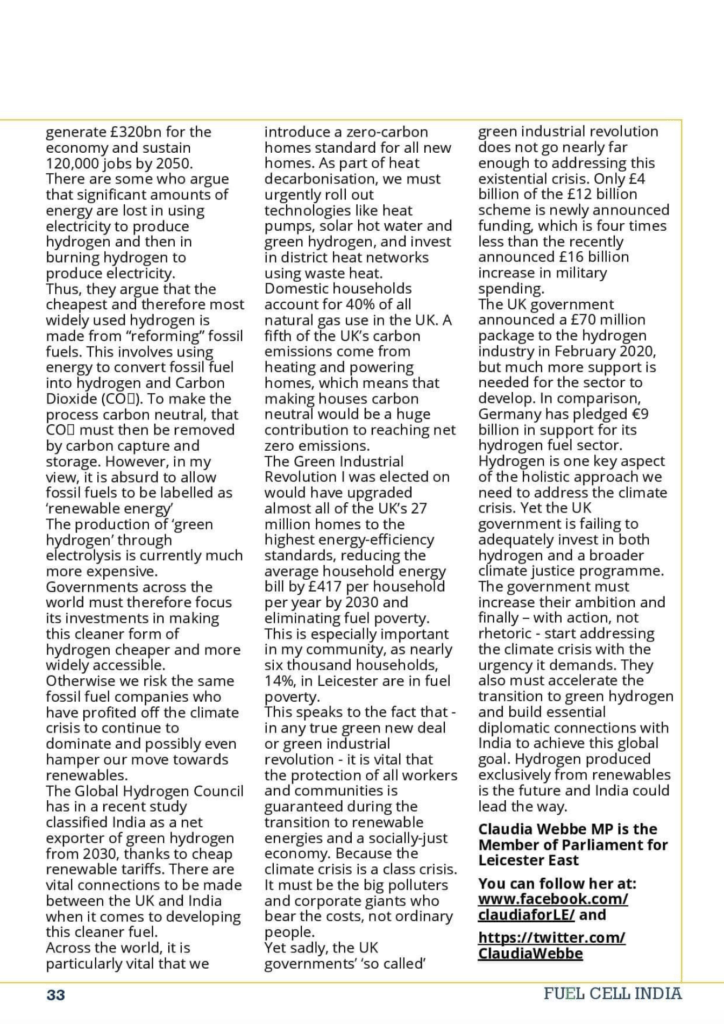


India could lead the world in green hydrogen – the question is not how we can afford it, but how can we afford not to.
By Claudia Webbe MP
The Indian community plays a hugely important role in modern British society. There is a large Indian diaspora in the UK, and particularly in my own constituency of Leicester East, who make a unique and incredibly valuable contribution to our community. Leicester has the second highest proportion of Indian residents out of any city in the UK, and Indians make up one of the largest demographics in our city.
Therefore, like many of my constituents, I am concerned that India is already feeling the impacts of climate change. Heatwaves are becoming more common and severe; heavy rain events have increased threefold since 1950; and rising sea levels are posing new risks as a third of India’s population live along the coast. Low-income and other marginalised groups are most vulnerable to these hazards.
The economic costs associated with climate change in India are already immense. In 2020, a single event – Cyclone Amphan – affected 13 million people and caused over $13 billion in damage after it made landfall. One study suggests that declining agricultural productivity and rising cereal prices could increase India’s national poverty rate by 3.5% by 2040 compared to a zero-warming scenario; this equates to around 50 million more Indian people living in poverty.
Climate breakdown is not a distant threat – but is happening here and now. The World Meteorological Organization found that the 20 warmest years on record have been in the past 22 years. Global grain yields have declined by 10% from heatwaves and floods connected to climate change, unleashing mass hunger and displacement. Over one million people living near coasts have been forced from their homes due to rising seas and stronger storms, and millions more are expected to flee in the coming years.
Human-caused climate change has already been proven to increase the risk of floods and extreme rainfall, heatwaves and wildfires with dire implications for humans, animals and the environment.
Without immediate government intervention, the urgent action required to preserve a habitable planet will be too slow. This will cause unimaginable disruption and could cost millions of lives, most immediately and sharply in Global South countries which have contributed the least to climate change.
The coronavirus crisis has demonstrated that we are only as secure as the most vulnerable among us and that rapid social and economic change really is possible.
At this unprecedented moment, governments across the world must consider all possible interventions and regulations to phase out the extraction of fossil fuels and transition to renewables as soon as scientifically possible.
Hydrogen has a crucial role to play and could also provide much needed new jobs as we rebuild from the coronavirus crisis. A report released earlier this month by the Offshore Wind Industry Council and the Offshore Renewable Energy suggested the UK’s green hydrogen industry could generate £320bn for the economy and sustain 120,000 jobs by 2050.
There are some who argue that significant amounts of energy are lost in using electricity to produce hydrogen and then in burning hydrogen to produce electricity.
Thus, they argue that the cheapest and therefore most widely used hydrogen is made from “reforming” fossil fuels. This involves using energy to convert fossil fuel into hydrogen and Carbon Dioxide (CO₂). To make the process carbon neutral, that CO₂ must then be removed by carbon capture and storage. However, in my view, it is absurd to allow fossil fuels to be labelled as ‘renewable energy’.
The production of ‘green hydrogen’ through electrolysis is currently much more expensive. Governments across the world must therefore focus its investments in making this cleaner form of hydrogen cheaper and more widely accessible.
Otherwise, we risk the same fossil fuel companies who have profited off the climate crisis to continue to dominate and possibly even hamper our move towards renewables.
The Global Hydrogen Council has in a recent study classified India as a net exporter of green hydrogen from 2030, thanks to cheap renewable tariffs. There are vital connections to be made between the UK and India when it comes to developing this cleaner fuel.
Across the world, it is particularly vital that we introduce a zero-carbon homes standard for all new homes. As part of heat decarbonisation, we must urgently roll out technologies like heat pumps, solar hot water and green hydrogen, and invest in district heat networks using waste heat.
Domestic households account for 40% of all-natural gas use in the UK. A fifth of the UK’s carbon emissions come from heating and powering homes, which means that making houses carbon neutral would be a huge contribution to reaching net zero emissions.
The Green Industrial Revolution I was elected on would have upgraded almost all of the UK’s 27 million homes to the highest energy-efficiency standards, reducing the average household energy bill by £417 per household per year by 2030 and eliminating fuel poverty.
This is especially important in my community, as nearly six thousand households, 14%, in Leicester are in fuel poverty.
This speaks to the fact that – in any true green new deal or green industrial revolution – it is vital that the protection of all workers and communities is guaranteed during the transition to renewable energies and a socially-just economy. Because the climate crisis is a class crisis. It must be the big polluters and corporate giants who bear the costs, not ordinary people.
Yet sadly, the UK governments’ ‘so called’ green industrial revolution does not go nearly far enough to addressing this existential crisis. Only £4 billion of the £12 billion scheme is newly announced funding, which is four times less than the recently announced £16 billion increase in military spending.
The UK government announced a £70 million package to the hydrogen industry in February 2020, but much more support is needed for the sector to develop. In comparison, Germany has pledged €9 billion in support for its hydrogen fuel sector.
Hydrogen is one key aspect of the holistic approach we need to address the climate crisis. Yet the UK government is failing to adequately invest in both hydrogen and a broader climate justice programme.
The government must increase their ambition and finally – with action, not rhetoric – start addressing the climate crisis with the urgency it demands. They also must accelerate the transition to green hydrogen and build essential diplomatic connections with India to achieve this global goal. Hydrogen produced exclusively from renewables is the future and India could lead the way.
Claudia Webbe MP is the member of Parliament for Leicester East. You can follow her at www.facebook.com/claudiaforLE and twitter.com/ClaudiaWebbe


